Christian justification of slavery in the southern states of the US, and elsewhere, has often included the statement that Noah cursed his black son, Ham, and condemned him to be a “drawer of water and hewer of wood”, i.e. a slave.
I knew about that claim, but never really looked into it.
But recently an Aboriginal friend told me of an incident many years ago now when he was present when a white preacher told an Aboriginal congregation that they would always be servants because of the curse of Ham.
I was incensed, and grieved on his behalf. And I decided to improve my understanding of the curse of Ham.
The curse of Ham??
The Biblical justification for the inferiority of black people that justifies their enslavement supposedly comes from two Biblical passages.
Genesis 9
Ham saw his father Noah naked, which was apparently shameful in that culture. (There are some suggestions in later Jewish writings that something more sexual happened, but there is nothing of that in the text.) And so Noah cursed Canaan, Ham’s son, and said he would be a slave to his brothers.
The name Ham is similar to a Hebrew word meaning “dark”, and thus it was argued in both England and USA that black people were inferior to white people and were created to be slaves. For example:
- Scottish clergyman John Wemyss: “This curse to be a servant was laid, first upon a disobedient sonne Cham [Ham], and wee see to this day, that the Moores, Chams posteritie, are sold like slaves yet.”
- William Smith, a state senator from South Carolina: “this very African race are the descendants of Canaan…and are still expiating in bondage the curse upon themselves and their progenitors”.
But ….
There are many things wrong with the argument here, even if we accept the literal understanding of the Noah story.
- There is nothing that suggests that Ham was black. The word “Ham” (Hebrew: cham) is similar to hum, meaning “dark,” or “brown” but they have different etymologies. (This is sometimes disputed, but it seems the best authorities say this).
- Likewise there is nothing to indicate that his son Canaan was black – and Canaanites are not black.
- The curse is pronounced by Noah, not by God.
- Black Africans are not descended from Canaanites.
- There is no suggestion that other black people, perhaps said to be descended from Ham but not Canaan (e.g. via Cush), should be slaves.
Stepping back from a literal understanding, there are further problems with the white supremicist interpretation. If we examine the story on its merits, we can reasonably conclude that the whole story of Noah, including a worldwide flood, is legendary.
The three sons of Noah are said to be the ancestors of local nations, not all nations globally – e.g. the Semitic peoples including Israel (Shem); the Canaanites, Babylonians and Jebusites (Ham); and peoples in Asia Minor (Japheth). But this doesn’t accord with modern ethnology, as there is no scientific basis for such demarcations of race, nor is there anything to suggest that black Africans are included in the descendents of Ham..
Most interpreters believe the story of the curse was written to support the Israelites’ claim they were superior to the Canaanites, and thus entitled to the land of Canaan/Israel.
Joshua 9
There is another reference to the subjugation of the Canaanites in the story of Joshua. The first 12 chapters of Joshua tell of a brutal invasion of Canaan by the Israelites after their 40 year exodus from Egypt. It is said that the kings of 31 cities were conquered (and their inhabitants apparently wiped out) and their lands given to the tribes of Israel (Joshua 12). (The second half of Joshua tells a different story, but that isn’t important for this discussion.)
One city (Gibeon) withstood the Israelite attack, by tricking Joshua into agreeing to a treaty. Joshua is reported to have honoured the treaty, but “he made the Gibeonites woodcutters and water carriers for the assembly, to provide for the needs of the altar of the Lord” (Joshua 9:27).
Since the Gibeonites were Canaanites, it was said that this reinforced the curse of Ham. The phrase “drawers of water and hewers of wood” was thus sometimes used to describe the role of African American slaves.
But ….
Again, there are many things wrong with this argument.
- Joshua’s curse was directed at the Gibeonites, not any other Canaanites who remained, and certainly not to all descendents of Ham.
- There is no suggestion the Gibeonites were black, or that the black Africans enslaved in the USA were their descendents.
- The Gibeonites were made workers for “the altar of the Lord”, which hasn’t existed since the Jerusalem temple was destroyed in 70 CE. This has nothing to do with slavery on southern US cotton farms!
- The curse was pronounced by Joshua not by God.
- Because of the marked difference between the narratives in the two halves of the book of Joshua, there is considerable doubt about the historicity of this part of the Joshua account, a doubt reinforced by the archaeology.
Slavery is abhorrent
Enslaving another human being is abhorrent to most people. The mistreatment of black slaves in the US south was beyond awful.
The justification of slavery in the US was based on quite obviously biassed and unjustified readings of passages that come from a far-off culture and are of doubtful historicity. (Even the relatively conservative Gospel Coalition agrees.)
If such passages could legitimately be used in this way, US slave-owners would be subject to God’s command in Acts 17:26 (“From one man he [God] made all the nations, that they should inhabit the whole earth; and he marked out their appointed times in history and the boundaries of their lands.”) If God marked out their boundaries, white slave-owners shouldn’t even be in America but should have remained on their own lands in Europe. Likewise, they shouldn’t be removing Africans from the lands God appointed for them. Of course, I don’t believe that passage should be used to prevent emigration, but if over-literal interpretations are being used, it should apply.
While the slave-owners in the southern states of the USA identified as Christians, Christians were also at the forefront of anti-slavery law-making in both England and the USA.
A clear conclusion
These parts of the Bible were used cynically and unjustifiably to serve the profit-making ends of slave-owners.
I knew that already of course, but it was worth checking the matter out.
Sadly, some white supremicists still use this argument, and some Christians still ignore clear Biblical teachings in favour of this sophistry. It seems to be part of a pattern of denigrating those you wish to take advantage of – as in the ironic 1840 cartoon below.
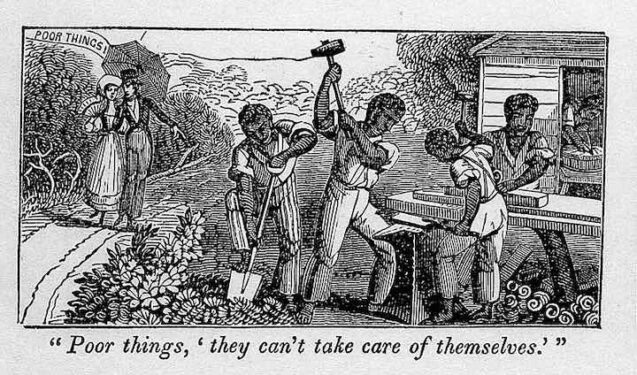
References
- Curse of Ham and Generations of Noah (Wikipedia).
- The Blessing of Whiteness in the Curse of Ham: Reading Gen 9:18–29 in the Antebellum South. Wongi Park, MDPI.
- The Curse of Ham: A Case of Rabbinic Racism? David M. Goldenberg, in Struggles in the Promised Land, ed. Jack Salzman and Cornel West (New York/Oxford: Oxford University Press, 1997)
- The ‘Curse of Ham’: how people of faith used a story in Genesis to justify slavery. The Conversation, 2024.
- Bob Dylan’s moving reflection on slavery in Blind Willie McTell. (It’s really worth a listen!)
Top photo: Family of enslaved black Americans in a field in Georgia, circa 1850 (Wikipedia).
Cartoon asking who is taking care of whom: Wikipedia.
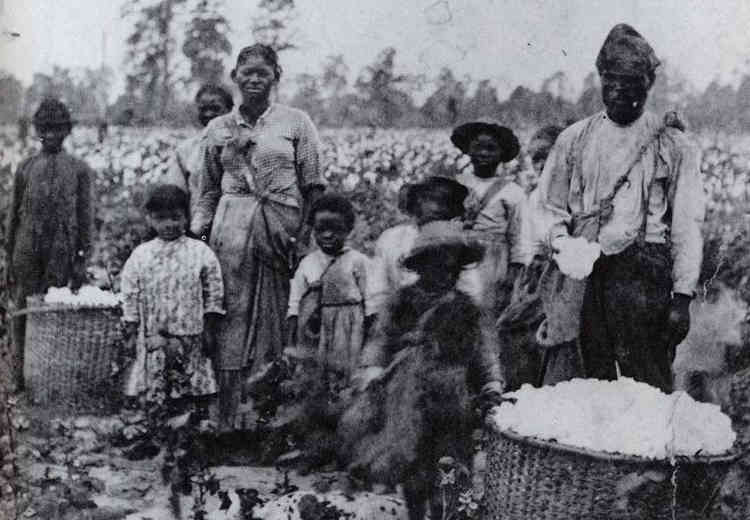
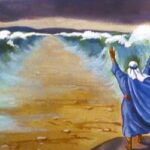

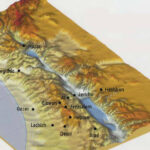
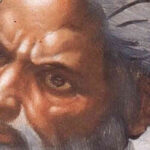
Why do Christians use the Old Testament to justify their views?
Isn’t it for Jews?
Surely the NT should be the guide for Christians, especially in the modern world?
Yeah, I agree, sort of. The OT (or strictly, the Tanakh) was the scripture of Jesus and the apostles. So since the very first Christians were also Jews, it seems natural for them to continue to accept the OT as scripture. It seems to have been their pattern to retain the old even when it was partially replaced by something new/ (I think we can see this pattern in the way the prophets modified and added to the Law, but both were included in the scriptures.
I think the problem is in how it is used. So much of it doesn’t apply now, we have something new. As Jesus said in the Sermon on the Mount, the Law said something and he had a higher standard. So it can be used as an account of what was before, but not much as a guide to what should be now.
I have long thought that the NT should come first in the Bible and the OT came later as a kind of Appendix. Then people who decide to read the Bible will read the important bit first.
Do you think that the prophets went along with the old laws because they believed them or because they realised they wouldn’t last long having heretical views?
I don’t think it was out of fear. I think they were raised in that culture and religion, and they believed it in the main, but they also saw ways it needed to be improved or put right. But they were also children of their time, so I think they still used concepts that we would not hold to today. So the whole thing was, I believe, a work in progress.
Early European Farmers were worshipping the deity Ham, practicing ritual human sacrifice and cannibalism in Herxheim Germany 7,000 years ago. This culture may have originated in Crimea on the north shore of the Black Sea in the Baia Hamangia culture. The genes which were inherited from ancient hunter gatherers are known to be associated with an increased probability of psychosis.
The descendants of these pagans inherited maritime culture and began spreading colonization, slavery, paganism, human sacrifice, warfare, and the symbol of the swastika (the “Mark of Cain”) throughout the entire ancient world by boat. This maritime culture became the Bell Beaker people who replaced the male descendant of the Anatolians that constructed Gobekli Tepe and Stonehenge. This occurred when the slaves of Egypt were constructing pyramids.
The Romans created maps of Germania. What is now called the Netherlands was once called Caninefates (or Cananefates) and Chamavii. The word “Cananefates” may have originated as “Canaanvaderates”, literally “Father of Canaan”. This seems to be the origin of the word “Confederate”, which would explain why Alabama is named for Elo Ba’ Hamae, and why the Bahamas are named for Ba’ Hamas, and why Jamaica is named for Jameh. It appears that the Dutch Canaanites were the original pirates of the Caribbean. The flag of the Confederate States, Alabama, Florida, and Jamaica use an “X” symbol that originated in Neolithic Kazakhstan. This symbol which was spread by ancient maritime cultures is still used as the ensign of the Russian Navy.
Hi, Fisher Shepherd, thanks for coming to my site and sharing all that information. Where did you obtain it from? I couldn’t find any link to a deity named Ham, or to some of the other things you mention.